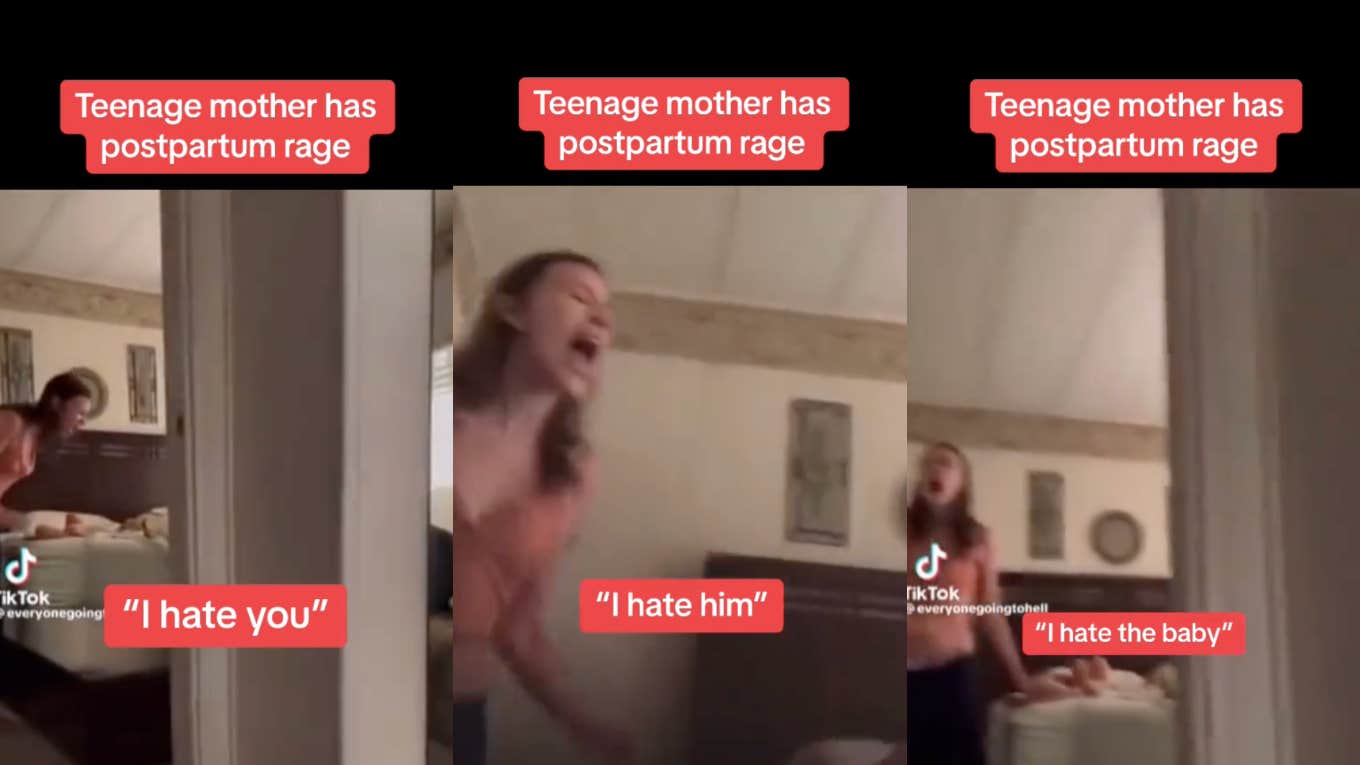A Dad Records A Mom Yelling 'I Hate You' At Their Baby & Receives All Sorts Of Feedback
The video prompted many people to urge this mom to seek out the professional help and support she needs.
 @youngm0msclub / TikTok
@youngm0msclub / TikTok A mother's concerning behavior toward her infant has sparked a discussion about the importance of support for postpartum mothers.
In a video that has begun circulating on TikTok, a husband recording his wife's violent and angry outburst toward their child left many people appalled and sympathetic.
The man filmed his wife yelling about how much she hates their baby boy.
In a 6-second video that has been reposted by other content creators on TikTok, an unnamed father is seen recording his wife, who is yelling at their infant son that she "hates" him. The man's wife, who is supposedly a teenage mom, is heard screaming into her baby's face, "I hate you!" as her husband attempts to calm her down.
"I hate the baby! I hate him!" she shrieked as her husband hurriedly approached her to take her away from their son and cool off. The short clip garnered a range of mixed reactions, but everyone agreed that it was clear this mother needs some sort of support, from both her husband and a licensed professional.
"Postpartum rage/depression/psychosis needs more attention. It's real and it's scary it can happen to anyone my heart breaks for this young mother and baby," the TikTok user who reposted the video wrote in their caption.
In the comments section, others chimed in with similar thoughts, pointing out that suffering from postpartum depression and psychosis can completely change a person.
"No one is shaming this mother, as a mom myself and someone that knows many other mothers, this is common and understandable," one TikTok user wrote.
Another user added, "I'm so glad we know what we know about postpartum now. I hope they can get her some help before she does anything she regrets out of anger."
"Poor thing, this is real, the delusions and psychosis make you a different person. I hope she is getting love and support," a third user added.
Postpartum psychosis should be treated as a serious mental health emergency.
According to the National Institutes of Health, postpartum psychosis is defined as being the severest form of mental illness in that category characterized by extreme confusion, loss of touch with reality, paranoia, delusions, disorganized thought processes, and hallucination. Around 1 in 500 women can be affected by this after giving birth, and while it is considered normal and only lasts a few days, there are other instances where it can become something much more severe.
When a mom, like the one shown in the clip, is suffering from postpartum depression or psychosis, her ability to provide nurturing care, bond with her infant, and meet the child's emotional and physical needs can be significantly compromised.
It's why interventions are important so that this mother and any other mothers who are experiencing something as scary as this can receive the right treatment for their mental health that will allow them to take better care of their babies.
While it's vital to remain empathetic and supportive, it is also possible that two things can exist at the same time. This mother clearly needs help, but she is also being extremely abusive to her child, which shouldn't be tolerated at all. It's easy to point fingers and claim that her husband shouldn't have been recording her, and that can be true, but it's also imperative to know that in these types of situations, many people don't know how to react in the right way.
This mother's distressing attitude towards her infant son has undeniably ignited a crucial discussion about the importance of supporting mothers during their postpartum journeys, whatever that may look like. While the gravity of the situation is undeniable, it's essential to tread carefully, understanding that complex emotions and actions often exist simultaneously.
If you know someone, or if you're experiencing postpartum psychosis, depression, or any other mental health issues after giving birth, it's crucial to seek help and support from professionals and organizations that specialize in maternal mental health.
The National Alliance on Mental Illness (NAMI) offers information and support for individuals and families dealing with mental health conditions, including postpartum psychosis, along with the Postpartum Support International (PSI), which also offers a range of resources, including a helpline, online support groups, and local support coordinators who can connect you with resources in your area.
Nia Tipton is a Chicago-based entertainment, news, and lifestyle writer whose work delves into modern-day issues and experiences.

